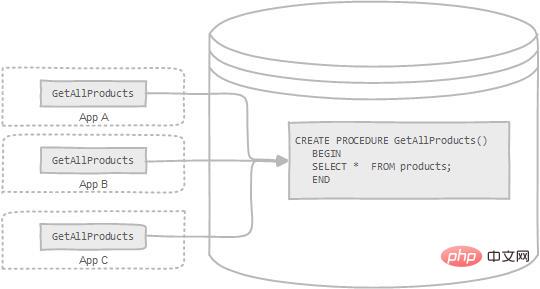What are the advantages and disadvantages of mysql stored procedures
Advantages: 1. Helps improve application performance; 2. Helps reduce traffic between the application and the database server; 3. It is reusable and transparent to any application; 4 , It can improve the security of the database and the integrity of the data; 5. It can make the data independent. Disadvantages: 1. If many stored procedures are used, the memory usage of each connection using these stored procedures will increase significantly; 2. The structure of the stored procedures is not designed for developing complex and flexible business logic; 3. Debugging Stored procedures are difficult; 4. It is not easy to develop and maintain stored procedures.

The operating environment of this tutorial: windows7 system, mysql8 version, Dell G3 computer.
Definition of stored procedure
A stored procedure is a declarative SQL statement stored in the database directory. Stored procedures can be called by triggers, other stored procedures, and applications such as Java, Python, PHP, etc.

The stored procedure that calls itself is called a recursive stored procedure. Most database management systems support recursive stored procedures. However, MySQL does not support it. Before implementing recursive stored procedures in MySQL, you should check the version of your MySQL database.
Stored Procedures in MySQL
MySQL is known as the most popular open source RDBMS and it is widely used by communities and enterprises. However, for the first decade of its existence, it did not support stored procedures, stored functions, triggers, and events. Starting with MySQL 5.0, these features were added to the MySQL database engine, making it more flexible and powerful.
Advantages of MySQL stored procedures
-
Usually stored procedures help improve application performance.
Once created, the stored procedure is compiled and stored in the database. However, MySQL implements stored procedures slightly differently. MySQL stored procedures are compiled on demand. After compiling the stored procedure, MySQL puts it into cache and maintains its own cache of stored procedures for each connection. If the application uses the stored procedure multiple times in a single connection, use the compiled version, otherwise the stored procedure works like a query.
Stored procedures help reduce traffic between the application and the database server because the application must send only the name and parameters of the stored procedure instead of sending multiple lengthy SQL statements .
Stored procedures are reusable and transparent to any application. Stored procedures expose the database interface to all applications so that developers do not have to develop functionality that is already supported in stored procedures.
-
Improve database security and data integrity.
One way to improve the security of stored procedures is to use them as intermediate components. The stored procedures can perform related operations on certain tables, and then the stored procedures are provided as interfaces to external programs. In this way, external programs cannot directly operate database tables and can only operate corresponding tables through stored procedures. Therefore, security can be improved to a certain extent.
-
Make data independent.
The independence of data can achieve the effect of decoupling, that is to say, the program can call stored procedures instead of executing multiple SQL statements. In this case, the stored procedure isolates the data from the user. The advantage is that when the structure of the data table changes, there is no need to modify the program when calling the table. The database administrator only needs to rewrite the stored procedure.
In addition to these advantages, stored procedures also have their own disadvantages that should be noted before using them in a database.
Disadvantages of MySQL stored procedures
If you use many stored procedures, the memory usage of each connection using these stored procedures will be significant. increasing. Furthermore, if you overuse a large number of logical operations in a stored procedure, the CPU usage will increase because the database server is not well designed for logical operations.
The construct of stored procedures is not designed for developing complex and flexible business logic.
Debugging stored procedures is difficult. Only a few database management systems allow you to debug stored procedures. Unfortunately, MySQL does not provide tools for debugging stored procedures.
Developing and maintaining stored procedures is not easy. Developing and maintaining stored procedures often requires a specialized skill set that not all application developers possess. This can cause problems during application development and maintenance phases.
MySQL stored procedures have their own advantages and disadvantages. When developing an application, you should decide whether to use stored procedures based on the application's architecture.
[Related recommendations: mysql video tutorial]
The above is the detailed content of What are the advantages and disadvantages of mysql stored procedures. For more information, please follow other related articles on the PHP Chinese website!

Hot AI Tools

Undresser.AI Undress
AI-powered app for creating realistic nude photos

AI Clothes Remover
Online AI tool for removing clothes from photos.

Undress AI Tool
Undress images for free

Clothoff.io
AI clothes remover

Video Face Swap
Swap faces in any video effortlessly with our completely free AI face swap tool!

Hot Article

Hot Tools

Notepad++7.3.1
Easy-to-use and free code editor

SublimeText3 Chinese version
Chinese version, very easy to use

Zend Studio 13.0.1
Powerful PHP integrated development environment

Dreamweaver CS6
Visual web development tools

SublimeText3 Mac version
God-level code editing software (SublimeText3)

Hot Topics
 1389
1389
 52
52
 How to open phpmyadmin
Apr 10, 2025 pm 10:51 PM
How to open phpmyadmin
Apr 10, 2025 pm 10:51 PM
You can open phpMyAdmin through the following steps: 1. Log in to the website control panel; 2. Find and click the phpMyAdmin icon; 3. Enter MySQL credentials; 4. Click "Login".
 MySQL: An Introduction to the World's Most Popular Database
Apr 12, 2025 am 12:18 AM
MySQL: An Introduction to the World's Most Popular Database
Apr 12, 2025 am 12:18 AM
MySQL is an open source relational database management system, mainly used to store and retrieve data quickly and reliably. Its working principle includes client requests, query resolution, execution of queries and return results. Examples of usage include creating tables, inserting and querying data, and advanced features such as JOIN operations. Common errors involve SQL syntax, data types, and permissions, and optimization suggestions include the use of indexes, optimized queries, and partitioning of tables.
 How to use single threaded redis
Apr 10, 2025 pm 07:12 PM
How to use single threaded redis
Apr 10, 2025 pm 07:12 PM
Redis uses a single threaded architecture to provide high performance, simplicity, and consistency. It utilizes I/O multiplexing, event loops, non-blocking I/O, and shared memory to improve concurrency, but with limitations of concurrency limitations, single point of failure, and unsuitable for write-intensive workloads.
 MySQL's Place: Databases and Programming
Apr 13, 2025 am 12:18 AM
MySQL's Place: Databases and Programming
Apr 13, 2025 am 12:18 AM
MySQL's position in databases and programming is very important. It is an open source relational database management system that is widely used in various application scenarios. 1) MySQL provides efficient data storage, organization and retrieval functions, supporting Web, mobile and enterprise-level systems. 2) It uses a client-server architecture, supports multiple storage engines and index optimization. 3) Basic usages include creating tables and inserting data, and advanced usages involve multi-table JOINs and complex queries. 4) Frequently asked questions such as SQL syntax errors and performance issues can be debugged through the EXPLAIN command and slow query log. 5) Performance optimization methods include rational use of indexes, optimized query and use of caches. Best practices include using transactions and PreparedStatemen
 Why Use MySQL? Benefits and Advantages
Apr 12, 2025 am 12:17 AM
Why Use MySQL? Benefits and Advantages
Apr 12, 2025 am 12:17 AM
MySQL is chosen for its performance, reliability, ease of use, and community support. 1.MySQL provides efficient data storage and retrieval functions, supporting multiple data types and advanced query operations. 2. Adopt client-server architecture and multiple storage engines to support transaction and query optimization. 3. Easy to use, supports a variety of operating systems and programming languages. 4. Have strong community support and provide rich resources and solutions.
 How to connect to the database of apache
Apr 13, 2025 pm 01:03 PM
How to connect to the database of apache
Apr 13, 2025 pm 01:03 PM
Apache connects to a database requires the following steps: Install the database driver. Configure the web.xml file to create a connection pool. Create a JDBC data source and specify the connection settings. Use the JDBC API to access the database from Java code, including getting connections, creating statements, binding parameters, executing queries or updates, and processing results.
 How to view sql database error
Apr 10, 2025 pm 12:09 PM
How to view sql database error
Apr 10, 2025 pm 12:09 PM
The methods for viewing SQL database errors are: 1. View error messages directly; 2. Use SHOW ERRORS and SHOW WARNINGS commands; 3. Access the error log; 4. Use error codes to find the cause of the error; 5. Check the database connection and query syntax; 6. Use debugging tools.
 Monitor Redis Droplet with Redis Exporter Service
Apr 10, 2025 pm 01:36 PM
Monitor Redis Droplet with Redis Exporter Service
Apr 10, 2025 pm 01:36 PM
Effective monitoring of Redis databases is critical to maintaining optimal performance, identifying potential bottlenecks, and ensuring overall system reliability. Redis Exporter Service is a powerful utility designed to monitor Redis databases using Prometheus. This tutorial will guide you through the complete setup and configuration of Redis Exporter Service, ensuring you seamlessly build monitoring solutions. By studying this tutorial, you will achieve fully operational monitoring settings




